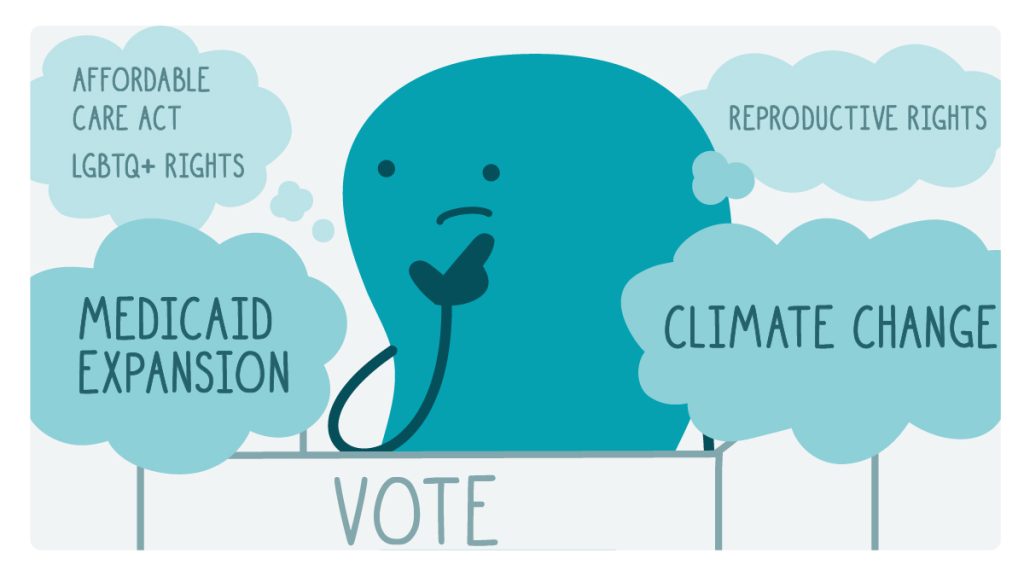
In less than 2 weeks, people across the country will vote on who they think should set the tone of U.S. politics for the next 4 years. While it’s hard to overstate the significance of this election for any number of public health-related topics — think reproductive freedom and health care, LGBTQ+ rights, and firearm violence, to name just a few — we wanted to zoom out today and look at the bigger picture. And that is how we can participate in and shape the way political decisions are made — a process that requires civic literacy.
Civic literacy is the skillset people need to play an active role in the processes that shape their communities and society at large. It includes understanding how our country’s institutions work to keep public life running, and how our leaders make decisions that affect nearly every aspect of our lives. It also includes understanding our rights and responsibilities within that context — whether it’s casting your vote on election day, staying informed about current issues, or having respectful discussions with others who might have different opinions.
You might wonder, what does all of this have to do with health? A whole lot! Consider this, dear reader:
Civic literacy is the foundation for civic engagement and participation — playing an active role in improving the quality of life in your community. Research shows that civic engagement supports better health. And there are many ways to get involved, from volunteering at a local food bank to coaching a youth sports team or even running for public office.
Civic literacy includes media literacy — the ability to find (and think critically about) information. Supporting media literacy may be our best defense against health mis- and disinformation. (For more on this tricky topic, check out the Practical Playbook for Addressing Health Misinformation.)
Health care is inherently political. Whether it’s setting a framework for insurance providers (like the Affordable Care Act), regulating how much drug manufacturers can charge for medicines, or passing laws to protect or restrict people’s access to services, policy decisions affect nearly every aspect of health care. Highlighting those connections for our audiences — and empowering them to get involved — is part of our job as health communicators.
So how can we promote civic literacy and engagement among our audiences? While this is certainly a bigger task than we can accomplish through health communication alone, there are a few strategies we can use:
- Educate readers about health-related policies. There are many, many examples of this, ranging from expanding Medicaid to making insulin more affordable to banning potentially harmful medical devices. Understanding how policies can affect their health and access to care can empower people to take action.
- Point out opportunities for people to get involved. If you’re writing about a specific disability or health condition, try linking to relevant advocacy organizations. Many orgs share timely updates on policy issues that impact their audiences, along with opportunities for folks to make their voices heard. You can also encourage audience members to contact their elected officials to weigh in on the issues they care about.
- Offer a platform for civic discourse. If you have the option — for example, through your blog or social media presence — make space for your audience to discuss important health (policy) topics. It’s a good idea to implement a set of community guidelines to encourage a respectful exchange of opinions.
- Encourage people to have political conversations within their social circles. It can feel daunting to talk about political or social issues with loved ones who hold different views — but there’s power in seeing an issue through the eyes of someone you care about. Consider sharing resources to help people start the conversation.
- Go vote — and encourage others to do the same. Casting your vote in local, state, and federal elections is one of the easiest and most important ways to influence the decisions that shape community health. Check out these customizable social media messages and graphics from the Public Health Communications Collaborative (PHCC) to use on your platforms. You can also link your audience to resources (like BallotReady or Vote 411) people can use to register to vote in their state, learn about what’s on the ballot, or find their polling place.
The bottom line: Just as health literacy empowers people to make informed decisions about their health, civic literacy empowers people to be thoughtful, engaged members of society. As health communicators, we can work to promote both
Copy/paste to share on social (and tag us!): It’s election season — a great time to explore the concept of civic literacy and how health communicators can promote it. Check out CommunicateHealth’s post for more: https://communicatehealth.com/wehearthealthliteracy/civic-literacy #HealthLiteracy #HealthComm #GoVote
Browse recent posts